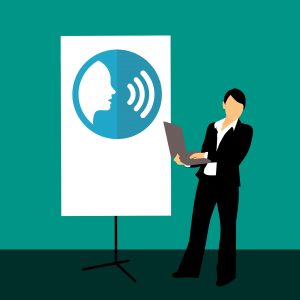Public speaking is best-received when the speaker connects with the audience in the same way that two people connect in a private conversation. To do this effectively, the speaker must understand herself and her audience.
Authenticity speaks volumes
Great public speakers are authentic and genuine. Audiences react to authenticity by connecting with the speaker and seeing the subject matter from the speaker’s point of view.
Your personality will engage the audience, not PowerPoint slides, props, or arm waving. If you are funny, be funny. If you are passionate, let them see that. Think of the things your family members and friends like most about you, and play up those qualities.
Don’t try to be something you aren’t. Fakeness is as repugnant in public speaking as it is in personal conversation. With an entire group of people watching, any affectation will be found out.
Struggling public speakers often feel nervous because they affect personalities that are not their own. They worry they will trip over phrases they would never say in personal conversation or freeze, unable to think of what their caricature should say.
Authenticity calms nerves and focuses the speaker’s mind on clear communication instead of their mannerisms and delivery. Your audience will embrace your sincerity, especially if the content is on target for their needs.
Understand your audience to better connect
Before choosing the topics and points for your presentation think through what your audience wants to know. Are they looking for details? Which details? What information is actionable, impactful, timely, or profound?
A dry presentation on useful information is more engaging than a dynamic presentation on something completely irrelevant. Understand what is useful from your audience’s perspective and focus on those points to start your presentation one step ahead.
For more public speaking techniques see our Public Speaking Training Class.











